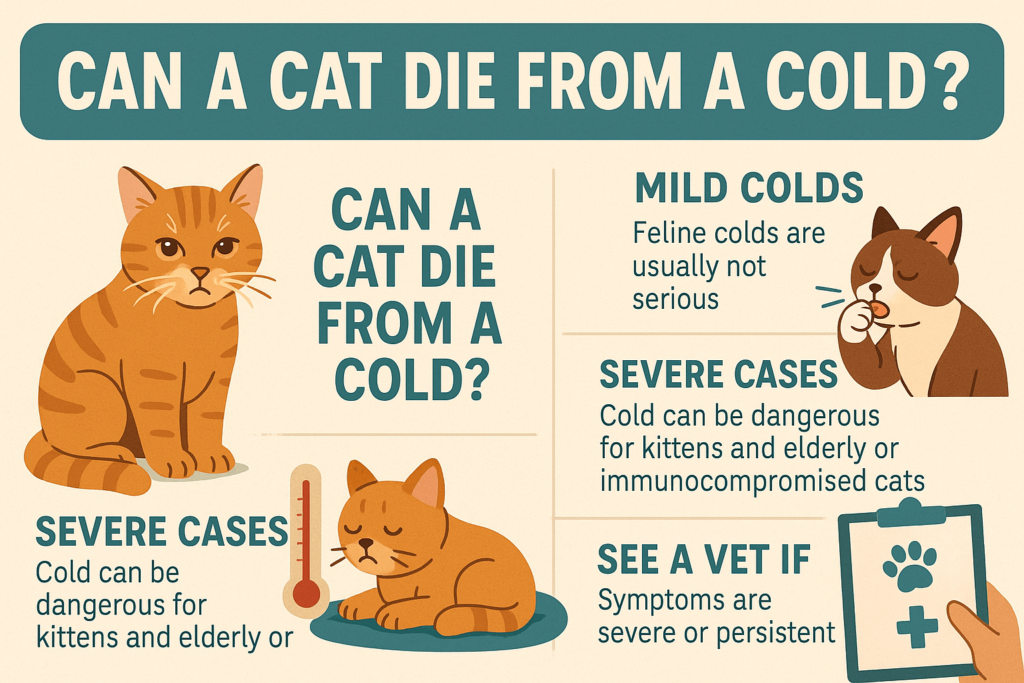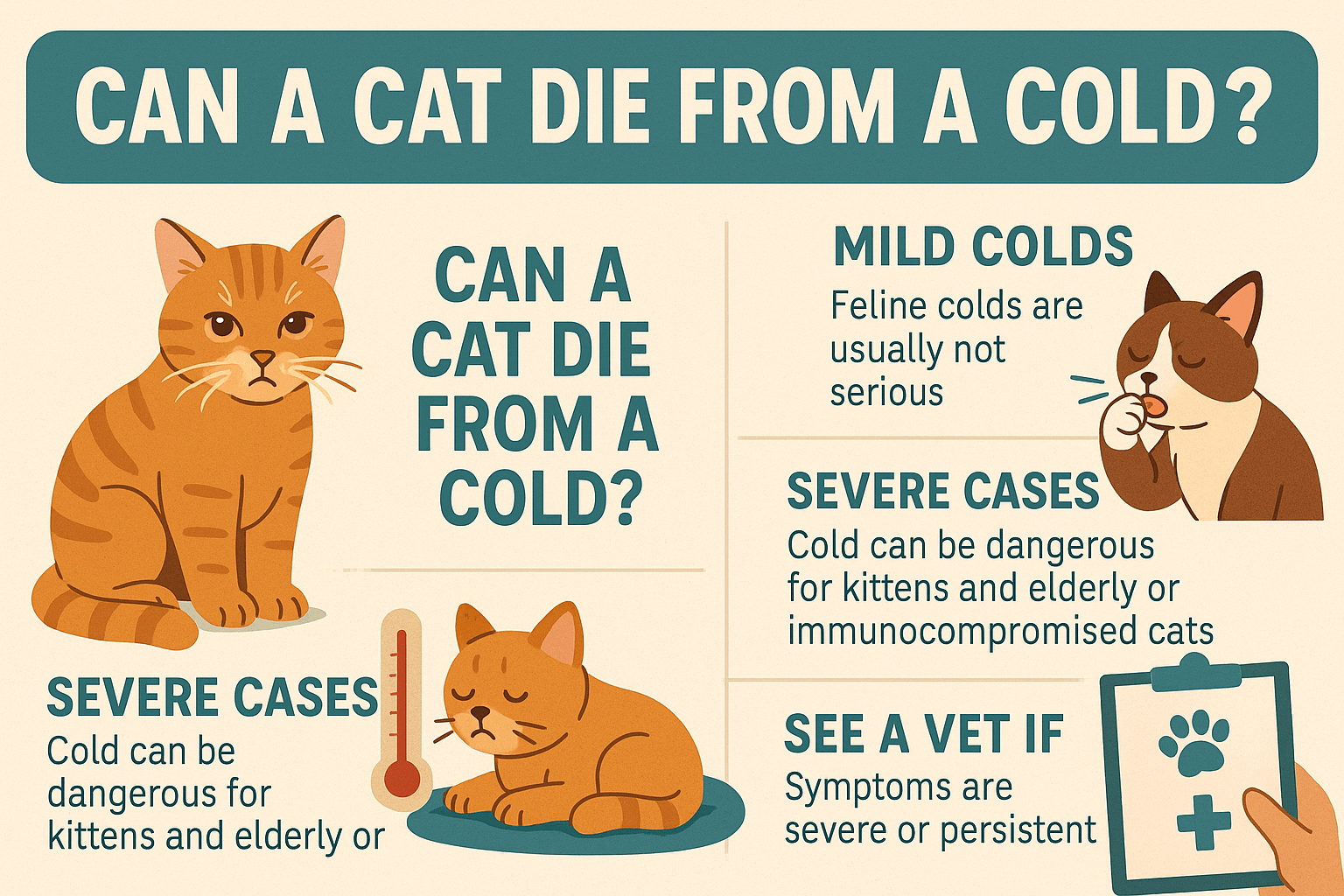Can a Cat Die from a Cold?
Cats, like humans, can catch colds and exhibit symptoms such as sneezing, runny noses, and watery eyes. While these symptoms may seem mild at first, many cat owners wonder if a simple cold could escalate into something more serious—or even fatal. The truth is that while most feline colds are not life-threatening, certain underlying conditions or complications can pose significant risks to your pet’s health. Understanding the causes, symptoms, and treatment options for feline colds is essential for ensuring your cat remains happy and healthy. Let’s explore everything you need to know about this common yet potentially serious issue.
Understanding Feline Colds: Causes and Symptoms
Feline colds, often referred to as upper respiratory infections (URIs), are typically caused by viruses or bacteria. Recognizing the signs early can help prevent complications and ensure timely care.
Common Viral Causes:
Feline herpesvirus and calicivirus are two of the most common culprits behind feline colds, especially in multi-cat households or shelters.Bacterial Infections:
Bacteria like Chlamydophila felis or Bordetella bronchiseptica can also lead to cold-like symptoms, often secondary to a viral infection.Sneezing and Nasal Discharge:
Persistent sneezing and nasal discharge are hallmark signs of a feline cold and should not be ignored.Watery or Crusty Eyes:
Eye discharge or swelling may indicate an infection that requires veterinary attention.Lethargy and Loss of Appetite:
Cats with colds may become lethargic or refuse to eat, which can worsen their condition if left untreated.
By understanding these causes and symptoms, you can take proactive steps to address your cat’s health needs before the situation escalates.

When a Cold Becomes Dangerous: Potential Complications
While most feline colds resolve on their own or with basic treatment, certain complications can arise, making it critical to monitor your cat closely.
Secondary Infections:
A cold can weaken your cat’s immune system, leaving them vulnerable to secondary bacterial infections that require antibiotics.Dehydration:
Cats with severe nasal congestion may struggle to drink water, leading to dehydration—a potentially life-threatening condition.Pneumonia:
In rare cases, a cold can progress to pneumonia, which requires immediate veterinary intervention.Chronic Respiratory Issues:
Some cats develop long-term respiratory problems, particularly if they have underlying health conditions or are seniors.Weakened Immune System in Kittens or Seniors:
Young kittens and older cats are at higher risk of complications due to their weaker immune systems.
Recognizing these potential dangers highlights the importance of seeking veterinary care if your cat’s cold doesn’t improve or worsens over time.
Check this guide 👉How Long Does a Cat Cold Last? Best 7 Expert Tips!
Check this guide 👉Can I Give My Cat My Cold? Best 7 Health Tips!
Check this guide 👉Why Are My Cats Ears Cold? Best 7 Expert Tips!
Signs Your Cat Has a Cold | When to Visit the Vet Immediately |
|---|---|
Persistent sneezing | Difficulty breathing |
Watery or crusty eyes | Refusal to eat or drink |
Runny nose | High fever or lethargy |
Mild lethargy | Severe nasal congestion |
Occasional coughing | Prolonged symptoms lasting over a week |
How to Care for a Cat with a Cold
Providing proper care at home can help your cat recover faster and reduce the risk of complications. Here are some practical tips to support your furry friend during their illness.
Encourage Hydration:
Offer fresh water frequently and consider adding wet food to their diet to increase fluid intake.Keep Them Warm and Comfortable:
Ensure your cat has a cozy, draft-free space to rest and recover.Use a Humidifier:
Adding moisture to the air can ease nasal congestion and make breathing easier for your cat.Clean Their Eyes and Nose:
Gently wipe away discharge with a damp cloth to prevent irritation and maintain hygiene.Monitor Their Appetite:
If your cat refuses to eat, try warming their food slightly to enhance its aroma and entice them to eat.
With attentive care, you can help your cat feel better and speed up their recovery process.
Preventing Feline Colds: Tips for a Healthy Cat
Prevention is always better than cure when it comes to feline colds. Taking proactive measures can significantly reduce the risk of your cat catching a cold.
Vaccinate Regularly:
Vaccines for feline herpesvirus and calicivirus are crucial for protecting your cat against common respiratory infections.Maintain a Clean Environment:
Regularly clean your cat’s living space to minimize exposure to germs and bacteria.Limit Exposure to Sick Cats:
Avoid introducing your cat to unfamiliar animals, especially those showing signs of illness.Provide a Balanced Diet:
A nutritious diet strengthens your cat’s immune system, helping them fight off infections more effectively.Schedule Routine Vet Checkups:
Regular vet visits ensure your cat stays healthy and allows early detection of potential issues.
By following these preventive measures, you can keep your cat happy, healthy, and less likely to catch a cold.
Common Misconceptions About Feline Colds
Misunderstandings about feline colds can lead to improper care or delayed treatment. Clearing up these misconceptions ensures better outcomes for your cat.
“Colds Are Always Mild”:
While many colds are minor, some can lead to severe complications like pneumonia if untreated.“Antibiotics Cure All Colds”:
Antibiotics only work for bacterial infections, not viral ones, which are the primary cause of most feline colds.“Indoor Cats Can’t Get Colds”:
Even indoor cats can contract colds, especially if exposed to other pets or contaminated environments.“A Cold Will Go Away on Its Own”:
While true in some cases, neglecting symptoms can allow the condition to worsen and become harder to treat.“Kittens Recover Faster”:
Kittens are actually more vulnerable to complications due to their underdeveloped immune systems.
Dispelling these myths helps cat owners approach feline colds with accurate knowledge and appropriate action.
Signs Your Cat Is Recovering Well
Monitoring your cat’s recovery is just as important as addressing their initial symptoms. These signs indicate your cat is on the mend.
Improved Appetite:
A return to normal eating habits shows your cat is regaining strength and energy.Reduced Sneezing and Discharge:
Fewer sneezes and clearer eyes/nose signal that the infection is subsiding.Increased Energy Levels:
If your cat resumes playful behavior, it’s a good sign they’re feeling better.Clear Breathing:
Smooth, unobstructed breathing indicates reduced congestion and improved respiratory function.Normal Behavior Patterns:
A return to grooming, exploring, and interacting means your cat is back to their usual self.
These positive changes confirm your care is working and reassure you that your cat is healing properly.
Supporting a Cat with Chronic Respiratory Issues
Some cats develop chronic respiratory problems after recovering from a cold. Ongoing care is vital to manage their condition and maintain their quality of life.
Regular Vet Visits:
Schedule checkups to monitor your cat’s respiratory health and adjust treatments as needed.Administer Prescribed Medications:
Follow your vet’s instructions for medications like antivirals or anti-inflammatory drugs.Minimize Stressors:
Keep your cat’s environment calm and stable to avoid triggering flare-ups.Provide Nutritional Support:
Feed a high-quality diet rich in antioxidants to boost their immune system.Create a Safe Space:
Designate a quiet area where your cat can retreat during periods of discomfort or fatigue.
With consistent care and attention, you can help your cat live comfortably despite chronic respiratory challenges.
Frequently Asked Questions About Feline Colds
Can humans catch a cold from their cat?
No, feline colds are species-specific and cannot be transmitted to humans.
How long does a feline cold last?
Most colds resolve within 7-10 days with proper care, but chronic conditions may require ongoing management.
What can I do if my cat won’t eat?
Try offering highly palatable foods or consult your vet if your cat refuses to eat for more than 24 hours.
Are certain breeds more prone to colds?
Brachycephalic breeds (e.g., Persians) are more susceptible due to their shorter nasal passages.
Can stress trigger a cold in cats?
Yes, stress can weaken a cat’s immune system, making them more vulnerable to infections.
Caring for Your Cat Through Thick and Thin
While a simple cold might not seem alarming, it’s essential to recognize when your cat needs extra care. By understanding the causes, symptoms, and potential complications of feline colds, you can take proactive steps to protect your furry companion. Whether through prevention, attentive home care, or seeking veterinary assistance, your efforts will ensure your cat stays healthy and happy. Remember, your love and dedication are the best medicine for keeping your feline friend purring through any sniffles life throws their way.
Can a Cat Be Tested for Rabies? Best 7 Expert Tips! – Learn if testing is possible, understand the process, and discover prevention tips to keep your cat safe from rabies.
Can a Dog Be Tested for Rabies? Best 7 Expert Tips! – Learn how rabies testing works, why it’s critical, and what every dog owner needs to know.
Best Vegetables for Cat Food: Best 7 Expert Tips! – Discover safe, nutritious veggies to boost your cat’s diet, support digestion, and enhance overall health naturally.
Best Vegetables for Dog Food: Best 7 Expert Tips! – Discover safe, nutritious veggies to boost your dog’s diet, support digestion, and enhance overall health naturally.





